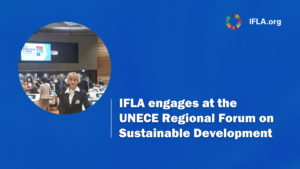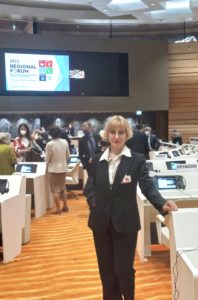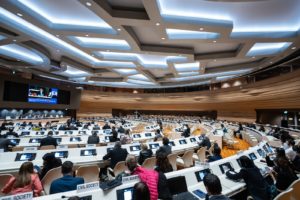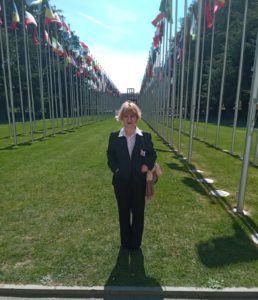IFLA engages at the UNECE Regional Forum on Sustainable Development
20 أبريل 2024
IFLA participated actively in the Regional Forum for Sustainable Development for Europe, which included a strong emphasis on promoting resilience and ensuring a strong and inclusive future. Maia Simonishvili, member of IFLA’s Europe Regional Division Committee, participated, using the opportunity to place libraries on the agenda, gather insights, and build connections.


SDG Delivery – an essential task, a unique library potential
The implementation of the 17 Sustainable Development Goals is especially important in the post pandemic world. In turn, access to information for every segment of societies is crucial to reach the goals most effectively. Libraries are arguably the most democratic and open educational centers in every country, and thus can play an essential role in spreading reliable information to all citizens.
IFLA plays an important role in helping libraries to build partnerships around the SDGs, providing support and tools even before 2015, when the world leaders adopted the SDGs at the UN General Assembly. In these, access to information is acknowledged as a target under SDG 16: “Target 16.10: Ensure public access to information and protect fundamental freedoms, in accordance with national legislation and international agreements.” (Transforming our world: the 2030 Agenda for Sustainable Development)
The Regional Forum – Official Opening
The Regional Forum on Sustainable Development was established by the United Nations Economic Commission for Europe (UNECE), with the aim to create “a regional mechanism to follow-up and review the implementation of the 2030 Agenda for Sustainable Development”.
On 6-7 April, the 2022 United Nations Economic Commission for Europe (UNECE) High Level Regional Forum on Sustainable Development took place in Geneva and online, due to the pandemic situation. Regional UN entities, governments, civil society actors, parliamentarians, representatives of academia, local governments and mayors, civil society, private groups, youth groups and other stakeholders attended meetings and side events to share their experiences, to highlight possibilities for innovations forced by pandemic, and to discuss new possibilities to make our vulnerable world more resilient by 2030.
Quality education and lifelong learning, Gender equality and empowerment of women and girls, life below water and on land, and partnerships for the goals were the main topics introduced during the forum, reflecting the focus SDGs at this year’s High Level Political Forum.
In particular, it was evident that the pandemic has made us rethink about learning methods and structure. It had a strong effect especially on women, faced with everyday situations that risked jeopardizing access to education. Beyond this, the pandemic has also made visible many underlying questions and problems, which were overlooked for many years, but which need to be solved for the benefit of future generations.
The High-level policy segment of the UNECE regional Forum 2022 was opened by Mr. Edil Baisalov, Chair of the Regional Forum on the SDGs, and Deputy Chairman of the Cabinet of Ministers of Kyrgyzstan. As he said, “the pandemic has profoundly impacted efforts toward achievement of 2030 Agenda. We are facing severe conflict in the region. Our priority must to keep moving forward. There can be no sustainable development without peace, and no peace without sustainable development. In line with the global SDG process, we are focusing this year on improving the quality of education, advancing gender equality, preserving life on land and life below water, and enriching partnerships for goals.”
Mrs. Amina J. Mohammed, Deputy Secretary-General of the United Nations mentioned four main priorities for the SDGs in her speech:
“The war in Ukraine is causing human suffering in massive scale, with 4 million refugees that fled to neighboring countries and more than 6 million internally displaced with figures rising every day. This is the worst refugee crisis since World War II. In this moment, the world will look at the discussion of this forum, hoping for solutions”.
While looking for peace, countries must protect the SDG agenda, focusing particularly on sustainable energy, food security and digital transition. Building a transition requires providing safety nests for the vulnerable, advancing digital connectivity and harnessing the potential of digital in education, work and health.
In addition, resilience in the face of the pandemic should be built, while vaccine inequity is a moral outrage and danger to all of us still. Alongside, there was also a need to overcome inequality, invest in women, refugees, underprivileged and youth. It is worth mentioning that by August 2022, we should see the results of the work of the High-Level Panel on the Multidimensional Vulnerability Index.
The fourth key objective is to reinvent the future of education. Today, education systems are challenged. Therefore, the UN Secretary General is conveying the Summit on Transforming Education in September. As part of this, efforts to build digital connectivity are high on the list of necessary actions.
Ms. Olga Algayerova, UNECE Executive Secretary and United Nations Under-Secretary-General begun her statement by addressing the situation in Ukraine, which is affecting the whole region. Extreme poverty is rare in the region, but ongoing challenges require steps to speed up collaborative actions, especially as concerns sustainable energy efficiency, food supply, and access to water and its quality.
Finally, she noted that the 2022 progress report shares positive news about international cooperation in the field of science and technology, but that progress must speed up to reach our goals by 2030.
Ms. Mirjana Spoljaric Egger, Vice-Chair of the Regional Collaborative Platform for Europe and Central Asia and Director of the UNDP Regional Bureau for Europe and the CIS emphasized the need for better vaccination programmes, a response to to the crisis in Ukraine, and improvements to food supply, health insurance and the education sector by developing a knowledge management hub as well as regional business management strategies.
The Representative of the Group of Independent Scientists, Dr. Åsa Persson, Research Director and Deputy Director of the Stockholm Environment Institute, Member of the Independent Group of Scientists for the 2023 UN Global Sustainable Development Report (GSDR) highlighted the latest scientific findings on the SDGs.
These took into account the disruptions caused by the COVID-19 pandemic and related recovery measures, as well as the process to prepare the 2023 Global Sustainable Development Report (GSDR).
According to her, today the world is approaching a halfway point in Agenda 2030. Due to the pandemic, there are some setbacks, but there are some positive trends, for example, companies invested more in R&D and innovation. Income equality had improved, but wealth inequality remains high .
The ultimate goal of this report was to review results and show a possible path forwards. In doing this, it was necessary to recognize that science, policy and society interact in different ways around for SDGs. As such, linear models providing evidence to policymakers are no longer ideal . The need for knowledge, resources and experience was growing vital, as is learning by doing. However, we see persistent inequality in the resources for science and knowledge. This is one of the future possibilities for library collaborations.
Closing the opening session, representatives of different states and political organizations presented brief overview of SDG development in their countries and expressed big concerns over events in Ukraine.

Key discussions for libraries
Librarians might be especially interested in the topics of a side-event focused on SDG 4: Quality education.
The subjects of the round table meeting were the learning crisis that had been deepened by Covid -19, and then the role of education (including Education for Sustainable Development) and enhancing inclusion in promoting equality and social cohesion.
According to the programme of the meeting, given the prevailing global health and pre-existing learning crisis, it is crucial to commit to recovery of learning losses for the most marginalized and vulnerable populations, including girls and women in the ECE region.
Existing challenges and progress in the advancement of digital skills among populations in the region, with a particular focus on women and vulnerable and marginalized young people, are also explored to better inform required policy actions and development interventions.
The meeting was moderated by Prof Mel Ainscow, Professor of Education of University of Manchester. Representatives of different countries (Georgia, Finland, Germany, Sweden, Switzerland, Uzbekistan, Kyrgyzstan, presented their experience in inclusive education, problems in education for minorities and underprivileged segments as well as their views for more democratization and inclusivity in the education process.
The Regional Director, UNESCO, Ms. Ana Luiza Thompson-Flores, the Deputy Regional Director, UNICEF Europe and Central Asia RO, Mr Philippe Cori, and Deputy Secretary General’s Office, Special Advisor to Transformative Education Summit, Mr. Leonardo Garnier hosted the round table discussion.
Representatives of UNICEF, ETUCE and BAGSO (Germany) introduced their programmes about inclusion of children and the older population, to overcome the digital divide and foster involvement of the population.
It is worth acknowledging, that all subjects connected to the inclusion of minorities and vulnerable segments of society in the process of education are potential areas of strong library engagement . Indeed, the meeting highlighted many areas where there would be scope to engage libraries more.
IFLA’s representative therefore asked openly what the best ways to promote collaboration with libraries would be. Mr. Philippe Cori, Deputy Secretary General’s Office answered that it is the subject of cooperation among different stakeholders and libraries have to be seen as a participants of the whole education process in joint projects.
The session on SDG17: Accelerating digital development through multistakeholder partnerships was interesting given a focus on mobile libraries and smartphone access to knowledge resources. The peer-learning session attracted many stakeholders, government representatives, private groups, academia and students to discuss how to work together to bridge the digital divide . Participants at the meeting included:
Partner2connect Digital Coalition, an alliance gathering actors from the private sectors, UN sister agencies, Governments, and Youth organizations, aiming to foster digital transformation and meaningful connectivity;
- Giga initiative,which aims to grasp the power of meaningful connectivity to fast-track young people’s access to educational resources and opportunities, and works with partner countries to systematically help governments connect every school to the internet through a four pillars approach: mapping, connecting, financing and empowering.
- GovStack Initiative: The GovStack initiative aims to build a common understanding and technical practice on fundamental reusable and interoperable digital components, which we collectively refer to as Building Blocks. It aims to enable countries to kickstart their digital transformation journey by adopting, deploying, and scaling digital government services.

We also engaged at the session on Quality of Education, SDG 4, Rebalancing people, planet and prosperity: Education for Sustainable Development (ESD) as a key enabler for the 17 SDGs and Agenda 2030
The aim of the session was to discuss and reimagine education for the resilient planet and healthy generations. Building on the global ESD for 2030 framework and its Roadmap, the 2021 Berlin Declaration on ESD, and the new UNECE Strategy for ESD implementation framework (2021 – 2030), this roundtable meeting was the possibility for different stakeholders from different countries to present their innovative projects to empower learners of all ages to be actively involved in the process of economic and ecological developments. ESD is an areas where, through so many of their activities, libraries are already making an important contribution.
Another subject of the conference was the development of Voluntary National Reviews, which provide the best opportunity to share information about achievements of SDG and to plan cooperation among different stakeholders and libraries.
At a plenary Session, forward-looking policies for sustainable COVID -19 recovery were discussed. For example, Prof. Andrea Innamorati, a Senior Policy Advisor for the Italian Ministry for the Environment, Land and Sea, introduced the post pandemic programme for Italy including Deep Dives on three aspects.
Italy had been strongly affected by the pandemic and so the country’s experience for the post pandemic recovery was especially interesting for the audience. The plan is due to 2026 and includes regional plans as well as city agendas, which will be represented in 10 Voluntary Local Reviews in July 2022, at the next Sustainable Development Forum in New York.
At this session, the Civil Society Forum was represented by Billiana Ginova, who expressed the need for a holistic and coordinated approach to policy making. “Goals and Agenda 2030 are transformative, because all of them are based on Human Rights. Economic achievements should foresee conditions of environment and society. “This is an agenda of the people by the people for the people, thus Civil Society should be recognized as an equal partner and major contributors to the Sustainable Development Goals. “
Libraries, as a cultural and educational bridges between governments and civil societies, privileged and underprivileged communities, are able to play the crucial role in implementing SDGs and promoting literacy according to 21th century standards to create healthier and happier environment for future generations.
Read more about the findings underpinning the discussions in Geneva: Halfway to 2030: Snapshot and insights in 2022